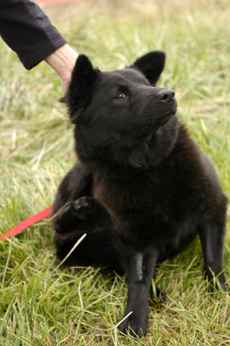Adoption made easy at humane society
October 22, 2004
While many college students are still sleeping in on Sunday mornings, Brenda Menard, a graduate student in law, will be busy training Fluffy, an 8-year-old pit bull, to stay on command.
Menard volunteers through People helping Dogs (PhD), one of several programs offered by the Champaign County Humane Society (CHHS) to help prepare abandoned dogs for adoption.
October is “Adopt a Dog Month,” sponsored by the American Humane Association, and at the CCHS, many adoptable dogs are waiting for a good home.
“People should always look at the animal shelter first for their pets,” said Harriett Weatherford, interim executive director of the CCHS.
There is a great need for people to adopt dogs, Weatherford said, because of the large number of animals that come in on a daily basis. It is the shelter’s policy to never turn an animal away. As a result, however, the shelter currently houses 95 dogs – well over their preferred capacity of 80.
Get The Daily Illini in your inbox!
Many of the dogs are owner-relinquished, left at the shelter for a variety of reasons, Weatherford said.
“People’s lives change and they decide they don’t want a dog anymore,” she said.
One such animal is Toby, a small, shaggy dog who sits in his caged dog run, watching the shelter staff as they walk by.
While many dogs are left by their owners, 50 percent of the ones at the shelter are strays that no one has claimed, Weatherford said. Strays are held for seven days; after that, they legally belong to the shelter. They are then screened for temperament toward other dogs, cats and people and are checked for health.
“It doesn’t mean the animal is 100 percent healthy,” Weatherford said. “It means they don’t have anything untreatable or that a person wouldn’t be willing to handle.”
Some strays and owner-relinquished dogs brought to the shelter are too young to be adopted or need more serious medical attention, said Weatherford. These dogs are placed in the shelter’s foster care program until they are ready to be adopted.
Vera Hanoka is the foster program coordinator at CCHS and has been a foster parent for ten years. Hanoka said she has taken in more than 100 dogs.
Participants in the foster care program must be licensed by the state, Hanoka said. This requires a $25 fee, and at the CCHS, interested participants also must attend orientation and training sessions.
Hanoka said she often takes in whole litters of puppies, but she has also had individual dogs.
The last dog she provided a foster home for was a 4-month-old puppy that had been dipped in motor oil by his owners in an attempt to cure his mange. This left chemical burns over his entire body, she said.
“He was always friendly, just miserable from the burns,” Hanoka said.
Hanoka nursed him back to health for five months, and after he was returned to the shelter, he was quickly adopted.
Hanoka said parting with the animals can be hard because she gets attached to them, but knowing they get adopted makes it easier for her to cope with the loss.
“There’s nothing like taking animals back when they’re ready for adoption and seeing them go to good homes,” she said. “It’s worth every minute of it.”
Once animals are healthy and have been properly socialized, they are put up for adoption, Weatherford said. After a potential owner has picked out the dog they want, the shelter requires them to fill out a short application.
“We want to see why people want the pet; if they want a companion, or if they’re just afraid the animal won’t get a home,” Weatherford said.
After a person’s application is approved, there is a one-day waiting period that gives people a chance to prepare for the dog and make sure they still want it.
“We find that with the waiting period, 20 people every month decide it’s not the right time for them to adopt,” she said.
The shelter also gives the dog a physical for $85, which includes spaying or neutering, a test for heartworm, a vaccination for distemper and a test and treatment for internal parasites, Weatherford said.
For people who have more trouble choosing a dog, the shelter provides assistance from adoption counselors, Weatherford said.
“Adoption counselors are volunteers trained to answer questions and pick out pets that fit a person’s lifestyle best,” she said.
Lisa Burgoon, an adoption counselor, runs the adoption program. She has been an adoption counselor for five years, she said.
“When a person comes in looking for a pet, they may or may not know what they’re looking for,” Burgoon said. “The role of adoption counselors is to help them decide what they’re looking for and help them find a match.”
Potential adoption counselors must have volunteered at the CCHS for at least a month. They are also required to attend three two-hour training sessions that combine classroom and hands-on training with an experienced worker, said Burgoon.
In addition to matching people with pets, adoption counselors also provide education on proper animal care, Burgoon said.
“If we place a dog in the right home, that person says good things about the humane society, and they’ll pass on education about the proper way to take care of dogs,” she said.
For more information, visit the CCHS Web site at http://www.cuhumane.org/







